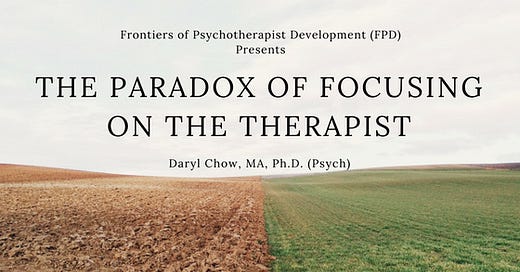The Paradox of Focusing on the Therapist
Updates by Daryl Chow, MA, Ph.D.(Psych)
View this email in your browser
The Paradox of Focusing on the Therapist
By Daryl Chow, MA, PhD on Nov 24, 2017 08:08 pm
Empathy has a hard time seeing a bigger picture. That is why fundraisers for charities do better when they tell a compelling story of an individual child with no access to clean water, rather than present the statistics of an entire group of people in a village. As Paul Bloom [1] argues,
“Empathy is innumerate.”
When Empathy Works Against You
As therapist, empathy is a skill that we shine. But empathy shines the light on a narrow area and ignores the rest of the contextual information. Empathy is innumerate. When you work with a client over several sessions, given what you know of this particular person, you continue to have hope for improvement. But combine this information with some base rate information (i.e., the longer the client stays in therapy without experiencing benefit, the less likely the person will experience benefit).
Back to the charity example. You empathy with an ad campaign that talks about the devastating crisis one girl faces. If you put her brother and 10 others in the same situation, your empathy for that girl drops. It’s illogical. We should care more, given that it affects more people. But our hearts are pulled by a single story.
That is why we need to be able to evaluate our performance from an aggregated level, in order for us to have a clear perspective and the road ahead as we stride ahead in our professional development.
One of my instrumental mentors who lit my world with his apologetic writings, C.S. Lewis, says it best: “Do not think less of yourself, but think of yourself less.”
An example: One of the worse ways to improve on something like public speaking is to practice in front of a mirror. Why? Because we become overly self-conscious.
We do not need more introspection, but more outrospection.
The Paradox
We are responsible for the process in therapy, not the outcome. In order for us to improve as therapists, we have to focus less about ourselves—and even less on the outcome (more on this in the next blogpost)—and more on the impact we can create.
In essence, we need to focus on the stuff that is influenceable and predictive, and has leverage on the outcomes.
Picture yourself saying the following:
“In order for me to develop as a therapist, may I learn to focus less on myself as I work towards bringing forth the very best of me, in service of the person I see that is in front of me, while keeping an eye on the relevant big picture. “
Best,
Daryl
Footnote:
[1] See developmental psychologist, Paul Bloom’s book, Against Empathy.
Recent Articles:
Repairable Models: It’s Time We Fix This
First Principles: The 5-Step Process for Deep and Accelerated Learning in Therapy
Three Ways to Develop First Principles in Your Clinical Practice
Develop First Principles Before The Methods
Develop Your Own Wealth of Learnings






